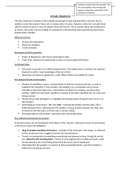be concerned by- the coming and
going of ships that remind him of his
stationary existence.
Arrivals, Departures
‘Arrivals, Departures’ speaks on the comings and goings of ships and describes a narrator who is
unable to resist the sound of their call, no matter when it comes. However, when he is actually faced
with the choice to leave or stay, he always choses the former. This is a poem about the predicament
of choice, and Larkin uses the setting of a dockyard to examine ideas about journeying and leaving
behind what is familiar.
Different themes:
Society and expectation
Desire for escapism.
Travel and place.
Key poems to link to and why:
Poetry of Departures- don’t know what path to take.
Triple Time- humans lost opportunity as they are preoccupied with future.
Contextual links:
The poem is evocative of a 1950s industrial town. The setting seems a familiar one, perhaps
inspired by Larkin’s own knowledge of the city of Hull.
Adventure not shown as glamorous- could reflect Larkin’s own dislike for travel.
Key aspects of form and structure:
Element of repetition in poem- representative in both the structure and text, as well as
implied in the narrative. In the narrative, the speaker is in a somewhat cyclic process,
whereby he hears the ships calls, contemplates his desire for escapism, and then does
nothing. Within the text itself, repetition is present in the ship’s pleading call- eg ‘come and
choose wrong.’
Present tense used throughout, to highlight the fleeting nature of opportunity- focus is on
the moment.
Interesting use of pronouns- ‘we’ and ‘they’- meaning the speaker and the ships. Like a
battle between them, reflecting how the speaker is trying so hard to ignore the ships calls.
Connection with the ships, as if they were a human calling.
Rhyming triplet at end of poem- summaries the main predicament.
Key methods and arguments of poem:
In the first stanza, we are introduced to the figure of the ‘traveler’, although it seems his journeying
is not due to choice but obligation:
‘Bag of samples knocking at his knees’- reminder of his profession. This image, re-enforced
by the consonance here, suggests that the job is burdensome.
Travel is not presented as something romanticized and glamorous here, though his arrival
was ‘blurted to the morning shore’. Choice of verb suggests this is sudden and loud- could
be interpreted as his arrival being declared by the horns and of importance.
Interesting that the speaker is so drawn to this unromanticised life- even this situation is
better than staying put on land.



